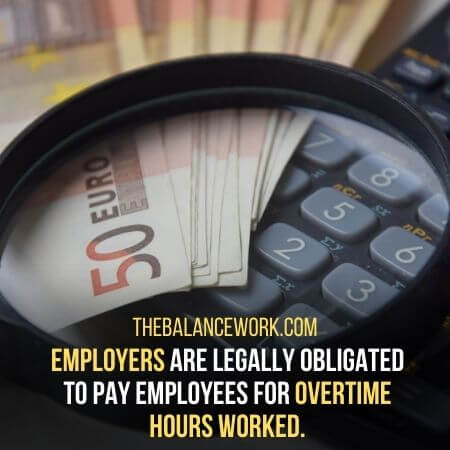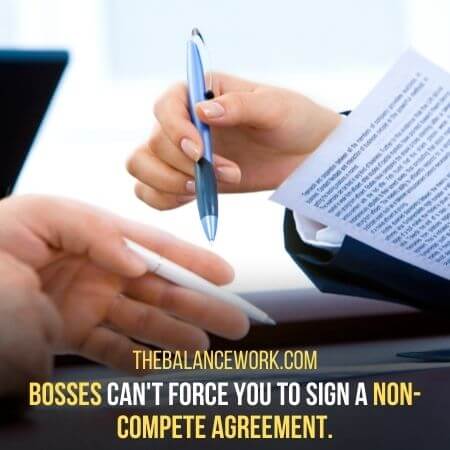Know your rights. And your worth. There are certain things even your boss can’t legally do. Let’s discuss them in detail to enlighten you.
Illegal acts can come in different shapes and colors. But they all have one thing in common- they are never justifiable.
15 Things Your Boss Can’t Legally Do
No matter how your boss tries to convince you, there are certain things they can’t do. Let’s discuss them in detail to enlighten you.
1. They Can’t Force You To Work Overtime Without Pay:
Primarily, employers are legally obligated to pay employees for overtime hours worked. This is especially true in the United States. This is one the things your employer can’t legally do and get away with.
Their employers must pay 1.5 times an employee’s regular pay rate for all hours worked over 40 days.

If your boss doesn’t want to pay you for your overtime hours, they’re breaking the law if your boss asks you to work off the clock.
This means they’re asking you to do work for free, which is illegal. It can get them to court.
Because of this, it’s essential to keep track of the hours you work. Speak up if your boss tries to make you work overtime without pay.
Let’s share briefly how to calculate overtime pay as per general guidelines:
– Overtime pay is generally 1.5 times an employee’s regular pay rate.
If your per hour wage is $5, then for every hour you work over 40 in a week, your boss will have to pay you $7.5 per hour.
– Some states have different rules, though. For example:
In California, employees must be paid double their regular pay rate for all hours worked over 12 days.
So, if you work 12 hours a day, your boss would have to pay you $10 per hour for overtime.
2. They Can’t Refuse To Pay You:
If you work, you have a right to get a wage. This is true even if you’re working for free or for a family member.
If your boss refuses to pay you, they’re breaking the law. They can’t simply decide not to pay you. If this happens, it’s essential to take action.
You can speak to an employment lawyer or file a complaint with the labor board in your state.
You can also sue your boss in small claims court. Many bosses try to get away with not paying their employees.
But you have rights, and you shouldn’t be afraid to assert them. Therefore, it is mandatory to get paid for your work.
3. Things Your Boss Can’t Legally Do – They Can’t Withhold Your Pay:
If you work, your boss has to pay you. They can’t withhold your pay as punishment or because you didn’t do something they wanted you to do.
This includes:
– Unpaid wages
– Unpaid overtime
– Commissions
For example:
If your boss wants you to work on a Saturday, but you don’t want to, they can’t withhold your pay for that week as punishment.

Some reasons why bosses withhold pay are:
– To discipline an employee
– For getting an employee to quit
– To get an employee to sign a contract
Some bosses use the power play and make improper use of their authority.
I saw many such instances wherein in a start-up environment. The boss doesn’t pay the employee for his work.
It is because they want him to learn a lesson or want to set an example for others. This is not only unethical but also illegal.
If this happens to you, it’s essential to stand for yourself. You can talk to your boss or file a complaint with the labor board.
4. They Can’t Make You Work In Unsafe Conditions:
Your boss has a responsibility to ensure that the workplace is safe. If your boss asks you to do something unsafe, that’s not legal. For example:
Your boss asks you to work with dangerous chemicals without proper safety equipment. That’s not allowed.
If you’re injured because of an unsafe workplace, you have all the right to sue your boss.
It’s important to know that employers, by law, have to provide a safe work environment.
Many employees think that it’s their responsibility to make the workplace safe. But that’s not true.
It’s the employer’s responsibility. So, if you’re working in an unsafe environment, speak up.
5. They Can’t Discriminate Against You:
It’s against the law for bosses to discriminate against employees based on their:
– Race
– Religion
– Gender
– Nationality
– Age
– Pregnant Status
– Disability
For example, a boss can’t refuse to promote you because of your race. Likewise, a boss can’t fire you because you’re pregnant.
When your boss is discriminating against you, you can sue them. It’s essential to know your rights and to assert them if necessary.
Discrimination is a serious issue, and it’s essential to be aware of your rights.
Talk to an employment lawyer if you think you’re being discriminated against. They can help you understand your rights and take action if necessary.
6. They Can’t Ask You To Do Something Illegal:
Your boss can’t ask you to do something illegal. For example, your boss can’t ask you to lie to the police or commit fraud.
If your boss asks you to do something illegal, you can refuse. You can also report your boss to the police or the labor board.
If you’re caught doing something illegal at work, your boss is responsible. It’s important to know that you have a right to refuse an unlawful order from your boss.
So, if you’re ever in this situation, don’t hesitate to stand up for yourself.

Many employees don’t dare to do this. It would help if you never were afraid to take a stand for ethical concerns.
7. Things Your Boss Can’t Legally Do – They Can’t Harass You:
It’s also against the law for bosses to harass their employees. Harassment can include:
– Making sexual advances
– Making offensive comments about someone’s race, religion, or gender
– Physical assault
If your boss is harassing you, you can sue them. It’s important to know that you have the right to work in a harassment-free environment.
Harassment is a serious issue. It is a crime even. Therefore, you have to take a stand if you feel your boss is harassing you.
8. They Can’t Retaliate Against You:
It’s also against the law for bosses to retaliate against employees. Retaliation can include:
– Threatening an employee
– Yelling at an employee
– Making false accusations against an employee
– Firing an employee without an offense
If your boss retaliates against you, they are being unethical and illegal. There is a fine line between retaliation and discipline.
So, it’s essential to know the difference. Retaliation is when your boss is punishing you for no reason.
Discipline is when your boss punishes you for a specific offense.
Retaliation is also if your boss punishes you because you complained about discrimination. If your boss retaliates against you, you can sue them.
9. They Can Not Fire You Without Just Cause:
It is also illegal for your boss to fire you without just cause. If your boss fires you without a good reason, you have a right to sue them.
The most common reason for firing someone is poor performance, which is legal. Likewise, many other reasons are permitted.
For example, your boss can fire you if you’re not a good fit for the job or taking too much time off.
But if you are a good employee and got fired for no reason, your boss is breaking the law. If this happens to you, don’t hesitate to take legal action.
Bosses fire people with an offense when they want to cover up their own mistakes.
10. Things Your Boss Can’t Legally Do – They Can’t Spy On You:
It’s also illegal for bosses to spy on their employees. This includes tracking employees:
– Emails
– Phone calls, and
– Internet usage.
If your boss is spying on you, you can sue them. It’s important to know that you have a right to privacy in the workplace.
Employers should never violate their employees’ privacy rights. So, if your boss is spying on you, stand up for yourself and file a lawsuit.
It may surprise you how many other employees have gone through the same thing.
Employees feel violated when their bosses spy on them.
But the concern is identifying that your boss doesn’t have a right to do this.
11. They Can’t Demand Private Information:
Bosses can’t demand private information from their employees. This includes:
– Social security numbers
– Bank account numbers
– Credit card numbers
Some reasons why bosses ask for their employees’ personal information is to:
– Run a credit check
– Check their criminal record
– See if they have filed for bankruptcy
If your boss demands private information from you, don’t hesitate to take legal action.

You have a right to keep your personal information private. Usually, employees feel obliged to tell their boss their personal information.
But, this is not the case. You are not obligated to tell your boss anything they don’t need to know.
Keep in mind that if you give your boss personal information, it’s essential to keep track of what they do with it.
So, if your boss does misuse your personal information, you have a right to sue them.
12. Things Your Boss Can’t Legally Do – They Can’t Force You To Quit:
It’s also illegal for bosses to force their employees to quit. This is constructive discharge.
Constructive discharge happens when an employer makes working conditions so bad that the employee is forced to quit. For example, if your boss:
– Threatens you
– Makes false accusations against you
– Spies on you
– Retaliates against you
These are some examples of what bosses can do to make an employee want to quit.
If your boss makes working conditions unbearable, you can sue them for constructive discharge.
It’s important to know that you don’t have to put up with illegal behavior from your boss.
You have a right to take legal action if your boss breaks the law. Don’t let them get away with it.
13. They Can’t Ask You Illegal Questions In Interview:
Bosses can’t ask you illegal questions in an interview. This includes questions about:
– Your race
– Your religion
– National origin
– Your sexuality
– Your disability
Interviews are not the time for bosses to start asking personal questions.
If they do, it’s best to walk away. Interviews don’t have to be perfect, but they should be legal.
You don’t have to answer any question you’re not comfortable with.
And, you don’t have to work for a boss who will ask you illegal questions.
14. They Can’t Force To Sign Non-Compete Agreement:
Bosses can’t force you to sign a non-compete agreement.
A non-compete agreement is a contract that says you will not compete with your employer after you leave the company.

Non-compete agreements are usually only enforceable if they are reasonable. This means the deal can’t:
– Prevent you from working in your chosen field
– Stop you from working in a specific geographic area
– Be for an unreasonable amount of time
If your boss tries to force you to sign a non-compete agreement, don’t hesitate to take legal action.
You have a right to work in your chosen field without restrictions. Many employees are not aware of this.
They end up signing non-compete agreements that are not enforceable. If you find yourself in this situation, seek legal help immediately.
15. Things Your Boss Cant Legally Do – They Can’t Sue You For Quitting:
Bosses also can’t sue you for quitting. This is a retaliatory lawsuit.
Retaliatory lawsuits happen when an employer sues an employee for quitting. For example, if your boss sues you for:
– Breach of contract
– Violation of company policy
– Refusal to sign a non-compete agreement
These are all examples of situations where your boss might try to sue you for quitting.
But they can’t do it. It is your right to quit for any reason you want.
If your boss tries to sue you, contact an employment lawyer. You don’t have to deal with this on your own.
Conclusion:
As you can see, bosses can’t do everything they want for their employees. There are many things your boss cant legally do.
There are laws in place to protect employees from illegal behavior. Some of the things your boss can’t do are:
– Force you to quit
– Ask you illegal questions in an interview
– Force you to sign a non-compete agreement
– Harass you
If your boss is doing any of these things, contact an employment lawyer.c
- Why Does My Boss Wink At Me? 6 Potential Reasons - October 5, 2023
- Is It Legal For Your Employer To Call Your Doctor? No, But… - October 4, 2023
- 12 Ways To Deal With A Low IQ Person - September 22, 2023